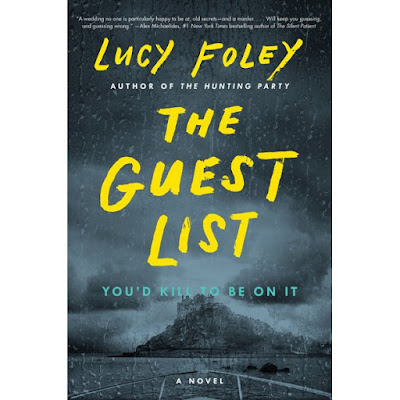Book Review: The Guest List by Lucy Foley
By Mary Beth Newbill | Southern History Department | Central Library
Lucy Foley’s newest, The Guest List, is getting lots of attention and rightly so. It’s her follow-up to The Hunting Party and I think she’s honing her skills on this particular variation of the closed circle mystery. She’s once again taken a group of mostly well-educated, hedonistic friends and deposited them on a remote island for what is ostensibly a celebration. Add in their very complicated histories and a dangerous, uncompromising landscape and you’ve ticked pretty much all my boxes.
Jules and Will have invited their closest friends and family to an uninhabited island off the coast of Ireland for what’s sure to be a most unique wedding. Jules runs a trendy online magazine and Will is on the verge of stardom thanks to his reality TV show, Survive the Night. They’re a couple made in social media heaven and they want their wedding to reflect their great beauty and allure. Are they in love? In my opinion, they are each in love with themselves and very much in love with the idea of their union.
Will’s friends from his school days are in attendance. The group is bound by the memories of their strict English public school whose headmaster was none other than Will’s father. Johnno is Will’s best friend and the others, collectively referred to as “the ushers,” all kind of run together. Even by the end of the book, I really couldn’t tell the difference between Pete, Angus, or Duncan. The other primary players are Jules’s sister, her best friend Charlie, and his wife, Hannah. The stoic and enigmatic wedding planner also has a few things to say for herself.
As the story progresses, several of the characters reveal a tragedy from their past which is still a source of great pain. With each chapter, you see their stories coalesce around one individual whose selfishness has left a trail of sadness and a desire for revenge. While we know from the beginning that a tragedy has occurred during the wedding reception, the identity of the victim is not revealed until the final chapters.
The story is told from several different perspectives and the narrative shifts from past to present with some chapters describing the search for the body, and others detailing each of the main characters’ thoughts and actions in the days and hours immediately before the gruesome discovery. If you don’t mind the almost Dickensian level of coincidence and characters who, let’s face it, are all kind of depressing, then this is a satisfying take on the classic English murder mystery.

Comments